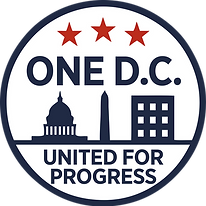
TRACEY L. LUCAS FOR D.C. MAYOR
CAMPAIGN PLATFORM 2
Affordable Housing and Homelesseness Solutions
Platform: Housing is a Human Right
-
Increase funding for affordable housing and accelerate the construction of mixed income developments.
-
Expand rental assistance programs to help low-income families stay in their homes.
-
Establish a Housing First model to tackle homelessness with immediate, permanent housing solutions paired with wraparound services.
Signature Proposal: The 10,000 Homes Initiative – Build or preserve 10,000 affordable housing units by 2028, with $1 billion in funding from public and private partnerships.
Funding Strategy: Funding the Affordable Housing and Homelessness Solutions platform and the 10,000 Homes Initiative will require a combination of public investments, private sector partnerships, federal grants, and innovative revenue mechanisms. Here’s the detailed funding strategy to secure the $1 billion required for the initiative:
1. Reallocation of Existing Budget
-
Affordable Housing Trust Fund (AHTF): Increase annual allocations to the DC Affordable Housing Trust Fund by redirecting underutilized funds from other housing related programs or surplus budgets.
-
Projected Contribution: $200 million over 5 years.
-
-
Consolidating Homelessness Programs: Streamline overlapping homelessness programs to increase efficiency and direct savings toward permanent housing solutions.
-
Projected Contribution: $50 million over 5 years.
-
2. Public-Private Partnerships
-
Developer Incentives: Work with private developers to build affordable housing through tax incentives, density bonuses, and expedited permitting processes in exchange for financial contributions.
-
Projected Contribution: $250 million over 5 years.
-
-
Corporate Housing Contributions: Engage corporations headquartered in DC to co invest in affordable housing as part of corporate social responsibility efforts.
-
Projected Contribution: $50 million over 5 years.
-
3. Federal and Grant Funding
-
HUD Programs: Apply for funding from the U.S. Department of Housing and Urban Development (HUD) for programs like HOME Investment Partnerships, Continuum of Care, and Community Development Block Grants.
-
Projected Contribution: $300 million over 5 years.
-
-
Infrastructure Grants: Leverage funding from federal infrastructure programs to build housing-related infrastructure, such as transit-accessible developments.
-
Projected Contribution: $100 million over 5 years.
-
4. Innovative Financing Tools
-
Municipal Housing Bonds: Issue housing bonds to raise capital specifically for affordable housing projects, with returns guaranteed by rental income or tax revenues.
-
Projected Contribution: $200 million over 5 years.
-
-
Social Impact Bonds: Use performance-based financing where private investors fund housing initiatives and are repaid based on successful outcomes, such as reduced homelessness rates.
-
Projected Contribution: $50 million over 5 years.
-
5. Local Revenue Streams
-
Luxury Housing Fees: Introduce a modest fee on luxury property sales or high-value real estate transactions, with proceeds earmarked for affordable housing.
-
Projected Contribution: $75 million over 5 years.
-
-
Vacancy Tax: Implement a tax on long-term vacant properties to encourage development and generate revenue for affordable housing.
-
Projected Contribution: $25 million over 5 years.
-
6. Philanthropic and Community Contributions
-
Foundation Grants: Partner with philanthropic organizations focused on housing equity and homelessness solutions. Projected Contribution: $25 million over 5 years.
-
Community Housing Investment Fund: Allow local residents and businesses to invest in affordable housing projects with guaranteed returns.
-
-
Projected Contribution: $25 million over 5 years.
How the Funds Will Be Used
The $1 billion for the 10,000 Homes Initiative will be allocated as follows:
1. Affordable Housing Construction:
-
Build 6,000 new affordable housing units, prioritizing transit-accessible areas and underserved wards.
-
Total: $600 million
2. Preservation of Existing Affordable Units:
-
Renovate and preserve 4,000 affordable units to prevent displacement and improve living conditions.
-
Total: $250 million
3. Rental Assistance Programs:
-
Expand rental subsidies for low-income families to prevent evictions and homelessness.
-
Total: $100 million
4. Housing First Model Implementation:
-
Establish permanent housing for homeless individuals, paired with mental health, employment, and addiction recovery services.
-
Total: $70 million
Projected Funding Breakdown
Source
Amount (5 Years)
Reallocation of Existing Budget
Public-Private Partnerships
Federal and Grant Funding
Municipal Housing Bonds
Local Revenue Streams
Philanthropic Contributions
$250 million
$300 million
$400 million
$200 million
$100 million
$50 million
Source
Amount (5 Years)
Conclusion
Tracey Lucas’s 10,000 Homes Initiative will be funded through a diverse and balanced approach that leverages federal support, private sector investment, and local innovations. This plan ensures that every dollar is maximized to provide affordable, stable housing for DC residents while tackling homelessness and housing inequities head-on.